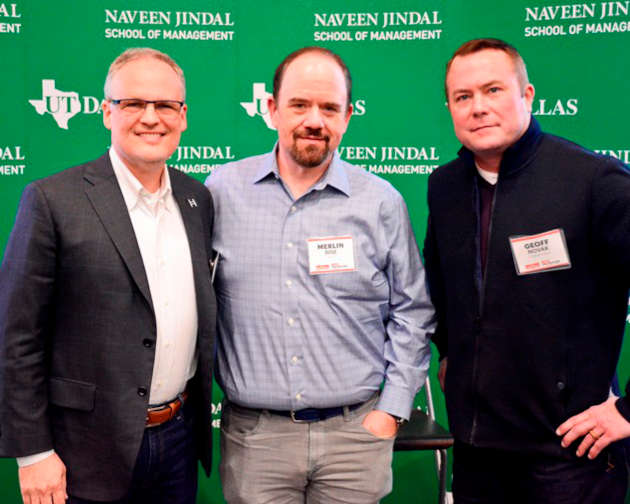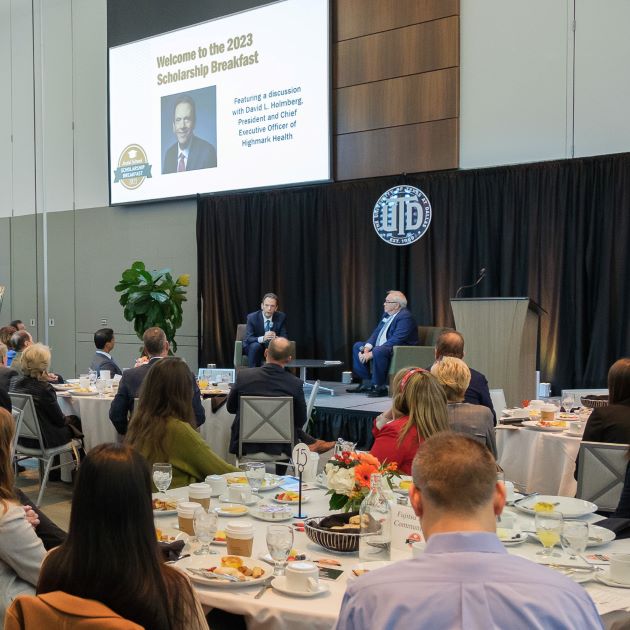The Dallas Business Journal’s NTX Disruptors series ended at The University of Texas at Dallas campus Dec. 5 with a panel discussion of experts who analyzed how new financial technologies, colloquially known as fintech, are disrupting the financial services industry in North Texas and beyond.
Co-sponsored by the Naveen Jindal School of Management and the mobile application firm Bottle Rocket, the event was the third in a series presented by DBJ in which local executives from various industries shared how they deploy disruptive, trailblazing technologies and strategies. Previous series events focused on disruption in the hospitality and travel space and in the healthcare industry.
Approximately 100 people attended the event in the Jindal School’s Executive Dining Room. Ollie Chandhok, DBJ’s president and publisher since October, kicked off the event and introduced Dr. Diane McNulty, associate dean for external affairs and corporate development at the Jindal School. She welcomed the audience to campus and introduced them to the school.

The panel of fintech speakers consisted of Mance Harmon, co-founder and CEO of distributed-ledger platform Hedera Hashgraph; Merlin Bise, CTO and co-founder of fraud detection firm GIACT; and Geoff Novak, vice president of technology strategy and innovation for Comerica Bank. Steve Guengerich, executive director of the Institute for Innovation and Entrepreneurship at UT Dallas, moderated the discussion.

Harmon, whose company’s technology, Hedera Hashgraph Platform competes with the better known cryptocurrency bitcoin, questioned the place of technology hubs like Silicon Valley and New York City in the fintech environment. He wondered if they have earned the right to be centers in fintech’s push to create the economic layer of the internet — known as the “internet of value.”
“I think Dallas is positioned — if you look at the number of Fortune 500 companies that are here — it’s a perfect market for leading that space,” he said. “We, as a company, are at the epicenter of that space. … We’ve headquartered the company here… We chose Dallas, and we want to be at the forefront of that and want to help Dallas own that market.”

Dr. David Springate, director of the Center for Finance Strategy and Innovation at the Jindal School, attended the event and was struck by what he sees as a digital transformation, a wholesale shift in how business will be conducted.
“These technologies, the digital ones, are transforming everything,” he said. “This transformation is creating a lot more value. Information is moving so fast now, in customized forms, that you can get what you want when you want it. Businesses have to keep up with this lightning-fast pace or else they will get left behind.”
Panelist Novak, a member of the UT Dallas Development Board as an ex-officio advisory council chair of the School of Arts, Technology, and Emerging Communication, offered his perspective on how disruption is manifesting itself in North Texas as a collaborative environment of industry, startup companies, business accelerators, venture capitalists and especially, he said, academia.
The North Texas region is poised to take advantage of the “collective firepower that exists in this community,” said Novak, who also served as an Executive Steering Committee member for the Institute for Innovation and Entrepreneurship’s 2018 Emerging Technologies Summit.
Building these relationships and establishing an open-innovation framework — those approaches that remove secrecy and encourage collaboration — will result in a competitive advantage for the region, Novak said.
Springate explained that the future role of management schools will be to teach managers and companies to recognize digital value and incorporate it into everyday business.
“It’s not just about starting companies — people will always start new companies and develop new technologies,” he said. “Management schools should focus on getting the value out of those new technologies and train people to come in with new strategies because these companies will have new risks. That’s the challenge for management faculties.”





